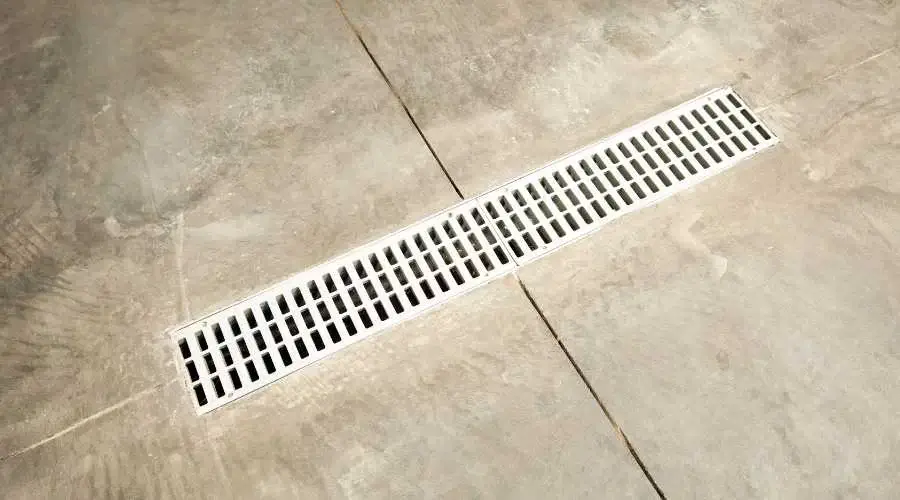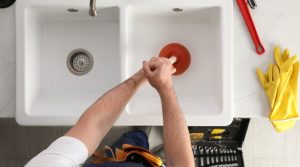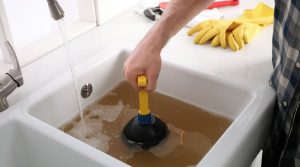Floor drains should be addressed. In addition to public bathrooms and showers, floor drains may be found in a garage, laundry room, or industrial kitchen. They are an essential component of public sanitation that should be considered. Overflow from sinks, tubs, showers, and toilets is collected by commercial floor drains and sent to a sewer or municipal storm drain. This keeps the floor dry and hygienic while also preventing rooms from flooding.
On the other hand, commercial floor drains must be kept in working order at all times. A blocked drain will not work correctly, resulting in an even worse problem. Proper drain maintenance is required to maintain your business drains in top functioning order.
5 Tips for Commercial Floor Drain Maintenance
1. Soapy Water Does Wonders
Sometimes a bucket of soapy water is required for business floor drain repair. Commercial drains in the floor may dry up if the flooring around the blocked drain needs to be cleaned regularly. To prevent the drain from drying up and to check for clogs, pour a 5-gallon pail of soapy water down it.
This not only prevents the drain from drying out but it also indicates if a blockage is forming. Water that drains slowly may suggest that the drain needs to be cleaned.
2. Avoid Dried Up Commercial Floor Drains
Your business drains should stay dry, as previously stated. Floor drains are part of your sewer system. They help to move overflow and lingering gases into the main sewage system. Commercial floor drains, like bathroom sinks, feature U-shaped P-trap pipes that operate as a wall to keep sewage gasses out. Any foul scents suggest the water trap has dried up, enabling undesired odors to escape.
As previously indicated, this may be prevented by regularly replenishing the drain traps with a bucket of soapy water. Adding water should help to remove any unpleasant odors.
3. Refrain from clogging your commercial floor drains.
When garbage is purposely swept into your drains, it may get clogged. This comes in handy in a commercial kitchen with food waste. Commercial floor drains may clog more often than other drains because they are located on the floor in areas where trash and filth may build. Your maintenance personnel may be tempted to sweep all this dirt down the drains on purpose, but doing so may cause all of this stuff to accumulate within, resulting in a clogged drain or even a worse problem. So, avoid sweeping dirt, food, or other debris into your industrial floor drains!
4. Don’t Ignore Stock Room Drains
Drain cleaning should be noticed, even in storage rooms or other normally idle areas. Cleaning these commercial drains is still required! They may dry out, allowing debris and rubbish to fill them and even block your sewer line. Clogs are difficult and expensive to fix but easy to avoid.
Ensuring that even idle stock rooms are washed once every few weeks, if not once a month, will keep these drains dry and in good condition.
5. Schedule Regular Floor Drain Cleaning
Preventative treatment is the most effective technique for avoiding potentially unpleasant and costly issues. Cleaning your business drains regularly is the most efficient method for keeping floor drains. It will be easier to remember preventive floor drain maintenance care if you mark clear your drains in your calendar at the conclusion or beginning of each month, and you may reduce the likelihood of blockages and other problems.
Keeping your business drains in good condition helps them to work as effectively as possible. A floor drain blocked with trash and dirt is rendered unusable. A floor drain maintenance program guarantees that your drains are in good functioning order and do not become a problem.
Do You Know How To Unclog A Floor Drain? Make Contact with the Experts
Use soapy water and a drain snake or auger to break up impediments in basic drain repair. Certain barriers, however, need the assistance of a specialist. Consider getting your business floor drain pipes inspected by a professional at least once a year.
A qualified plumber can detect warning indicators of drain performance problems, such as potentially significant clogs or leaks, far more accurately than the ordinary homeowner. We can advise you on the most effective strategy to service your commercial drains based on the metal you use and the type of pipes. Stainless steel, ductile iron, cast iron, and nickel are some of the materials used are some of the materials used. Some materials used are common metals and materials used in commercial drains. Each will have its own set of requirements.
This might assist business enterprises in avoiding pipe and plumbing concerns. While there are many things you can do to keep your floor drains and drain pipes in excellent working order, having a certified plumber come by once a year may be beneficial to your house. Contact CBJ Passaic Plumbers if you need assistance with a challenging blockage, business floor drain installation, or a professional examination of your floor drain pipes.






